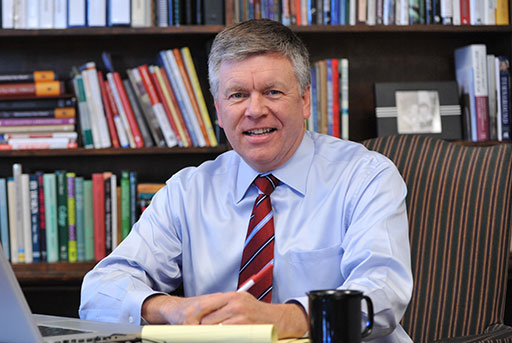Northwest Nazarene University began as an elementary school in 1913. Over the following decades, the school added a high school curriculum, a junior college, a full undergraduate program, master’s-level courses, and today, its first doctorates. This year, on its hundredth anniversary, Northwest Nazarene has about 1,300 undergraduates and 700 graduate students on its Nampa, Idaho, campus. In addition, about 8,000 students take courses online in one of several degree programs. About 45 percent of the student body hails from the Church of the Nazarene, an evangelical denomination of Wesleyan heritage.
David Alexander has been president of Northwest Nazarene University since 2008. In Trust recently asked him about the university’s new associate membership in the Association of Theological Schools.
Why did Northwest Nazarene University seek associate membership in the Association of Theological Schools (ATS)?
Northwest Nazarene University has an array of accreditations, with our primary one being from the Northwest Commission on Colleges and Universities, one of the regional accrediting bodies in the United States. In addition, we have specialized accreditation in areas such as education, counseling, social work, business, music, and nursing. For us, membership in the ATS Commission on Accrediting is similar to the accreditations we have in other fields.
Our School of Theology and Christian Ministries has a little over 300 students, both undergraduate and graduate. And we serve scores of others in a “continuing education” format. A couple of years ago, when we assessed where we stood and what we were offering, comparing our programs with some of the others that already had ATS accreditation, we determined that we might benefit from being part of ATS, and that the membership would validate and affirm the work we were already doing.
When we sought associate membership in ATS, we did so with graduate programs that are primarily online. We knew it would be either a validation or a rejection of the supposition that institutions can offer online theological education that merits accreditation.
 |
| Brad Elsberg/NNU Digital Media |
Until last year, when ATS accreditation standards were modified, your online-only theological degrees would have been ahead of the curve.
Right. We sought the counsel of ATS and they guided us toward a consultant who assessed our programs, knowing that ATS was in the process of seriously addressing the concept of online delivery modalities. Since we were already offering theological courses of study wholly online, we thought, “Let’s see how this plays out and move forward.”
Why did Northwest Nazarene move into online education in the first place?
We’re a church-sponsored university specifically founded to serve the churches of the Northwest, and we have long had people in ministry in remote areas who have wanted to pursue some form of continuing education.
What are the limits of online education?
Northwest Nazarene University has gone into online education at the graduate level before the undergraduate level because online education requires self-motivated learners.
On the other side, you also need a faculty member who is willing and able to deal with both the synchronous and asynchronous aspects of teaching online.
By “synchronous” you mean a class in which teachers and students gather at their computers at the same time and interact with one another in real time?
And by “asynchronous” you mean that teachers and students interact, but not simultaneously—right? Instead, they “chat” on course-specific discussion boards in threaded discussions that go on throughout the week.
We have programs and courses that behave in both ways, synchronously and asynchronously. They are completely different teaching paradigms.
Are your faculty members required to teach online?
The short answer is “no.” We have some faculty who teach solely online. A few are on-campus only. The majority do both.
How does spiritual and psychological formation take place for online students?
Research shows that if an online course is not a glorified correspondence course, but is based on cohorts of students who interact with professors and work together, over time a learning community will emerge. Frankly, there are more commonalities than you would initially imagine between on-campus and online students.
One of our challenges is this: As a faith-based, Christ-centered university, how do we foster spiritual formation and spiritual community in students who are in any of our graduate programs? Not just theological studies, but business students and education students and others.
I think we assume that at the graduate level, spiritual formation occurs relationally and naturally. So, perhaps the heart of your question is this: Can the online relationship between mentor and student, or between teacher and student, allow for the kind of relational nurture that comes from interaction?
That hinges on two things:
• Has the institution chosen professors willing to build relationships with online students and willing to understand how relational nurturing works in the online world?
• Has the institution trained its faculty not merely to provide an online commodity but to create relationships that a good professor can form online as well as in a classroom?
Is something being lost along the way—something like quality or the human touch—when we move from in-person to online education?
I say this as a 57-year-old university administrator: We cannot allow academic tradition to prevent us from using new teaching tools that give us greater access to students for the good of the Gospel.
I think the concerns of some of the ATS member institutions are justified: How do we expand access to education while ensuring quality, rigor, and consistency? I understand these concerns.
But I think it’s my job as an administrator not only to be concerned about quality, rigor, and consistency, but also to push us out into waters that we may be reluctant to sail in. Certainly other parts of the academy are much further out from the shore.
The key part of our enterprise is the spread of the Gospel and the equipping of those called to do so. To accomplish this, we need to be able to take advantage of all of these new delivery modes.